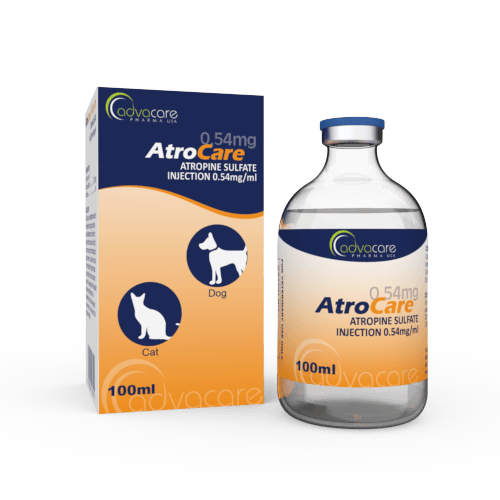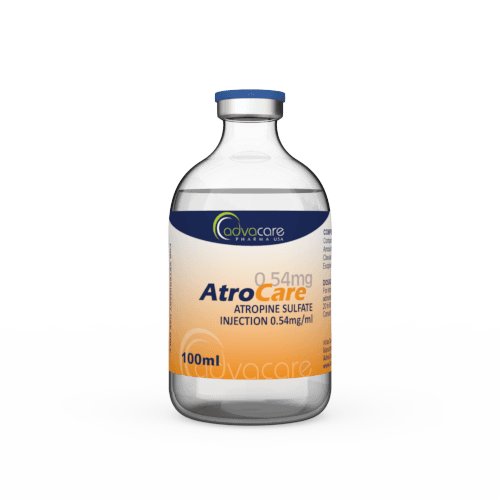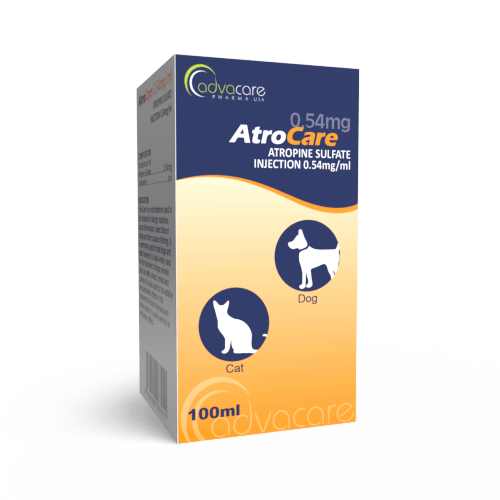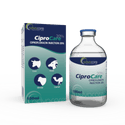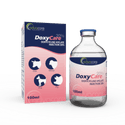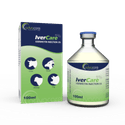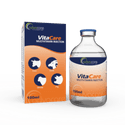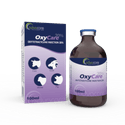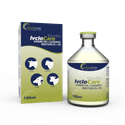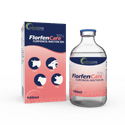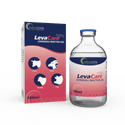- Home›
- Veterinary Pharmaceuticals›
- Veterinary Injections›
- Veterinary Liquid Injections›
- Atropine Sulfate Injection
Atropine Sulfate Injection
Dosage
Packaging
What is Atropine Sulfate?
Active Ingredients: Atropine Sulfate
Atropine Sulfate Injection is a drug used before anesthesia to decrease salivation and other respiratory secretions. It is also used in the treatment of bradycardia, mushroom poisoning, and cholinergic drug overdose. Atropine also decreases intestinal peristalsis which may be caused by colic or diarrhea.
Atropine is a naturally occurring substance found in deadly nightshade, Jimson weed, and mandrake. It is generally considered to be an anticholinergic or anti-parasympathetic drug. Atropine also displays antimuscarinic properties. This drug works by inhibiting smooth muscles and glands, and it also relaxes the GI tract and decreases the activity of the urinary tract.
This formulation of atropine sulfate has been manufactured as a sterile, nonpyrogenic isotonic solution. Sodium chloride has been added to render the solution isotonic. It is important to note that this product is for veterinary purposes only. It should be prescribed by a veterinary doctor or animal care specialist for an animal.
Atropine Sulfate Injection is produced by AdvaCare Pharma, a pharmaceutical company specializing in global distribution. AdvaCare manufactures this veterinary medicine in GMP-certified factories located in China, India, and the USA. We routinely inspect these facilities to ensure our products meet health, safety, and environmental standards.
Why are we a trusted Atropine manufacturer?
Atropine Injection is manufactured and globally distributed by AdvaCare Pharma, a leading manufacturer of veterinary injections in the pharmaceutical industry. We have been committed to distributing high-quality, GMP-certified veterinary medications for the global market over the past 20 years. As a top Atropine manufacturer, we ensure that all of our 100+ veterinary injections surpass our distributors' requirements by conducting routine internal and third-party facility audits.
Uses
What is Atropine Sulfate used for?
It is used to treat conditions such as:
- sinus bradycardia
- sinoatrial arrest
- incomplete AV block
- hypersialism
- bronchoconstrictive disease
It's used as an antidote for:
- cholinergic agent overdose (such as physostigmine)
- organophosphates
- muscarinic mushroom
- blue-green algae intoxication
Atropine Sulfate is used as a pre-anaesthetic treatment to reduce respiratory tract secretions. It is also used as a diagnostic aid to determine vagally mediated from non-vagal bradycardia.
What animals can be treated with Atropine Sulfate Injection?
This drug is recommended for companion animals like cats and dogs.
How should Atropine Sulfate Injection be stored?
This medication should be stored in a dark, dry location under 30°C. The vial should be sealed tightly.
Dosage
How much Atropine Sulfate should be given to dogs?
As an anaesthetic adjuvant, the usual dose is 0.02-0.074mg/kg IV/IM/SC.
For adjunctive treatment of bradycardias, incomplete AV block, etc., the usual dose is 0.02-0.04mg/kg IV/IM.
For cardiopulmonary cerebral resuscitation: 0.04mg/kg IV or IO. The dose may be repeated every 3-5 minutes for a maximum of 3 doses.
To treat cholinergic toxicity 0.2-0.5mg/kg, a fourth of the dose should be given IV and the remainder IM or SC.
For bronchoconstriction, the usual dose is 0.02–0.04mg/kg for a duration of effect of 1-1.5 hours.
How much Atropine Sulfate should be given to cats?
The usual dose is 0.02-0.074mg per kg of body weight.
For bradycardia, the usual dose is 0.02–0.04mg/kg IV/IM/SC.
For cardiopulmonary cerebral resuscitation: 0.04mg/kg IV or IO.
Treatment can repeat every 3–5 minutes for a maximum of 3 doses.
For cholinergic toxicity, the usual dose is 0.2–2mg/kg; give a quarter of the dose IV and the remainder SC or IM.
Refer to a veterinary doctor or pharmacist for guidelines on dosage.
Side Effects
As with all pharmaceuticals, some unwanted effects can occur from the use of Atropine Sulfate Injection.
Some common side effects may include but are not limited to:
- gastrointestinal effects (dry mouth, dysphagia, constipation, vomiting)
- urinary retention
- blurry vision or pupil dilation
- bradycardia (at first)
Serious side effects may include:
- allergic reaction (skin rash, fever, facial swelling, or difficulty breathing)
- circulatory failure
For a comprehensive list of all possible side effects of this medication, consult a veterinarian.
Precautions
Do NOT use Atropine Sulfate for Injection for an animal that:
- has a known allergy or hypersensitivity to atropine or any of the other ingredients.
- has a known hypersensitivity to any other anticholinergic drug.
- has narrow angle glaucoma.
- has heart problems like tachycardia, or myocardial ischemia.
- has a urinary obstruction or GI obstructive disease.
Treatment with this drug should be administered with caution for an animal that:
- is being given other medications, such as other anticholinergic medicines, antihistamines, phenothiazines, tricyclic antidepressants, alpha-2 agonists, antacids, corticosteroids.
- has a known or suspected gastrointestinal infection.
- has autonomic neuropathy.
- has renal disease, hyperthyroidism, hypertension, or esophageal reflux.
- is pregnant or lactating.
- belongs to the following species: horse, cattle
This medication should be used with caution in neonates or kittens younger than 11 days old. It can be used after the animals reach a certain body weight.

You might be interested in...
Why AdvaCare Pharma?
As an industry leader, we are aware of our responsibility to provide affordable and sustainable solutions to improve healthcare worldwide.
